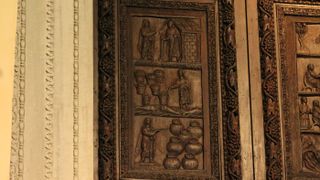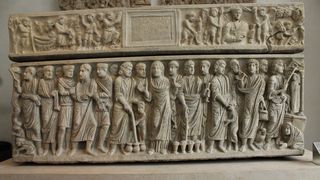
Was Jesus a magician?

Ancient art throughout the catacombs of Rome, painted on the walls and carved into stone coffins, shows Jesus as he multiplies loaves of bread, heals the sick and brings the dead back to life. These images are unified by one surprising element: In each of them, Jesus appears to brandish a wand. That led scholars to wonder: Did ancient Christians see Jesus as a magician?
Despite these evocative images, most evidence suggests early Christians didn't see Jesus as a magician. Magic was considered a purely human pursuit that could not raise the dead, whereas Jesus' supernatural acts were always seen by believers as miracles performed through a powerful God. What's more, the "wand" carried by Jesus was in fact not a wand —magicians of the day never carried wands anyway, experts told Live Science.
Magic and early Christianity
Still, magic was very much alive during the period of early Christianity. Between the third and eighth centuries, the years when images of what looks like a "wand-carrying" Jesus Christ adorned the burial sites of ancient Romans, Christianity was still in its infancy, existing alongside ancient Judaism as well as Roman gods and goddesses, said Lee Jefferson, the chair of the religion program at Centre College in Danville, Kentucky. "Even at the time of some of these images, they don't have an agreed upon Bible; they don't have a canon; they don't have an agreed upon understanding about who Jesus is," Jefferson told Live Science.
That said, it looked nothing like the magic we see in pop culture today. Magic centered around spells, which people would seek from magicians to deal with problems in their everyday lives, from sickness to love. Patrons of magicians took those spells home to recite, just like we would take medicine home from the doctor. Recite it wrong, and it wouldn't work.
Related: The surprising origin of 9 common superstitions
In a time of uncertainty, when people had little control over whether their crops survived and sickness was often a death sentence, magic provided a sense of control. That said, magic was looked down upon by Jews and polytheists alike, Jefferson said. Magic was seen as superstitious and it was banned in the Roman Empire. Although people continued to practice it in private, religious leaders saw it as shameful, Jefferson wrote in the book "The Routledge Handbook of Early Christian Art" (Routledge, 2018).

In this context, some people did call Jesus a magician — but as a form of slander. At the time, polytheist religious leaders saw Christianity as a form of superstition, like magic. "I mean, here's this group that gets together in the morning and drinks wine and says it's blood and eats bread and says it's flesh," Jefferson said. "You can probably understand why people thought it was superstitious." The philosopher Celsus, a vocal critic of Christianity, was among those who saw Jesus as a magician.
Sign up for the Live Science daily newsletter now
Get the world’s most fascinating discoveries delivered straight to your inbox.
But followers of Jesus never saw it that way. Their savior performed miracles, not magic — powerful acts of God that often defied death, very different from the human pursuit of magic, that dealt with small matters. "You would not want your demigod to be called a magician because it makes them seem less powerful," Jefferson said.
Jesus' ability to defeat death, heal people and produce food and drink elevated him above Roman gods in the eyes of Christians and non-Christians alike, said Felicity Harley-McGowan, an art historian at Yale Divinity School. They believed Jesus had a particular power over death and would invoke his name as a way of harnessing that power, even as they invoked the names of other gods. Roman gods could heal and raise the dead, but none performed these acts directly or with the agency of Jesus. For example, Asclepius, the god of healing, healed people through dreams; Jesus healed directly with his hands. While Asclepius was killed for raising the dead, Jesus was praised for it. Early Christian art reflects that preoccupation with miracles, and less focus on his story of suffering and redemption. For instance, though dozens of paintings exist of Jesus carrying what looks like a wand and raising Lazarus from the dead, relatively few early paintings depict Jesus' last supper or crucifixion, Jefferson wrote in a 2020 article published in the journal Biblical Archaeology Review.
Related: 8 alleged relics of Jesus of Nazareth
So why is Jesus depicted carrying an object that looks so much like a magic wand? Scholars tend to agree that "wand" isn't the best term to describe it. In fact, the tool probably wasn't associated with magic at all — it just appears that way to us, because it's filtered through the lens of modern conceptions of wizards, such as Harry Potter. In the earliest years of Christianity, magic didn't involve wands. No known artwork from that time period depicts magicians carrying them, Jefferson added. Instead, many scholars prefer the term "staff" to describe the object.
Regardless, the fact that Jesus carried a staff in these images does hold its own significance. In the earliest years of Christianity, people would have been familiar with Moses — a Jewish prophet and another miracle-worker — but not necessarily with Jesus. That staff connected Jesus to Moses, who also carried one and in fact performed miracles with it. "He's kind of like a new Moses," Jefferson said.
The staff was a symbol of power people could recognize — just as a beard or scroll would have demonstrated learnedness, Harley-McGowan told Live Science. "They see that person holding the object and they can understand," Harley-McGowan said, "The staff is a sign of his authority."
Originally published on Live Science.

Isobel Whitcomb is a contributing writer for Live Science who covers the environment, animals and health. Her work has appeared in the New York Times, Fatherly, Atlas Obscura, Hakai Magazine and Scholastic's Science World Magazine. Isobel's roots are in science. She studied biology at Scripps College in Claremont, California, while working in two different labs and completing a fellowship at Crater Lake National Park. She completed her master's degree in journalism at NYU's Science, Health, and Environmental Reporting Program. She currently lives in Portland, Oregon.
-
Chem721 One thing is certain. Anyone involved in science today would surely love to have a magic wand.Reply
We could convert all of our theories and postulates into reality with its simple touch, and no one could discredit them - simply because it was done by magic!
But do we know the proper incantations to make it work? That could launch a whole new area of research - Incantationology!
Where to begin seems the biggest question. -
FB36 Why God creating Adam w/o any parents does not make God his father/mother but God creating Jesus w/o father makes God his father?Reply
Maybe Jesus was a great but fully human prophet (just like Adam, Noah, Abraham, Moses, ...)? -
Inspector Reply
Ok, Adam is not the direct son of God, it's like saying a lion is a child of God just because God made the lion. That applies back to Adam, however, Jesus is the Son of God, only because hod but Jesus into a mortal womb and giving Jesus a Mortal Body. If you are also wondering why Christians call ourselves Children of God, it is because if we accept Jesus. His blood covers us, so God will only see the blood of Jesus, his son, so God will see us under the protection of Jesus, and as his own children Hope this helps!FB36 said:Why God creating Adam w/o any parents does not make God his father/mother but God creating Jesus w/o father makes God his father?
Maybe Jesus was a great but fully human prophet (just like Adam, Noah, Abraham, Moses, ...)? -
weismonger Reply
All religions are a belief and magic!admin said:Jesus' ability to defeat death, heal people and produce food and drink elevated him above Roman gods in the eyes of many people. A wand would have enhanced that image.
Was Jesus a magician? : Read more
But, it's a fact that magic doesn't exist
and Jesus' use of magic if he existed at all was very typical of hundreds if not thousands of street healers, charlatans, scammers, Preachers, and messiahs of which there were about 300 before during and after imaginary Jesus existed.
From all indications from historical records it appears that the Romans created Jesus as a new religion as a cash cow And to unify the Roman state. inventing gods what's the typical and existed for hundreds of years with Jesus not being anything special until pagan Emperor Constantine.
Furthermore, Jesus was patterned after the Vespasian Caesars, Who before imaginary Jesus was created performed exactly the same kind of healing, bringing people back from the dead turning water into wine etc.
Other "healer gods" such as Sepias existed long before imaginary Jesus showed up.
Christians are going to have to realize they have been bamboozled by the Roman catholic forgery factory which started this fraud on a big scale in 311 A.D..
In the first century, there were competing Christian groups would at least 11 versions of Jesus. Furthermore, Paul whose letters also preceded the 4 gospels rails against do you other Christians who had divergent views of what imaginary Jesus as a new God should be like.
When looking at the four Gospels it is amazing the Christians aren't stunned by how many divergent views Of the personality of Jesus make it appear that none of the apostles who wrote the gospels knew each other or even knew Jesus.
And because of so many versions of Jesus In the Bible, if he actually existed he appeared to have a multiple personality disorder.
For more information read:
"Nailed: Mything in action" by David Fitzgerald*
"Creating Christ" by James S Valliant & CW Fahy
"Ceasar's Messiah" by Joseph Atwill (This was the first book that alerted theologians and historians that the Romans created Jesus.)
*(And further archaeological research Has shown that the early Christians used exactly the same logo as the Roman empire of "two fishes or a dolphin on an anchor" which was also minted it on millions of coins. The "Christian cross" was not used is the primary symbol of Christianity until pagan Emperor Constantine in 311AD.)
